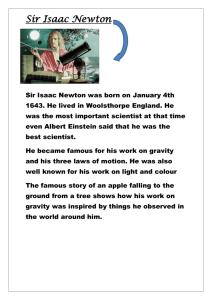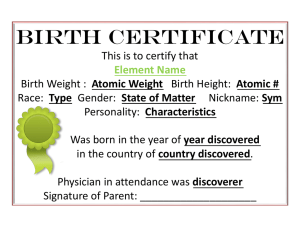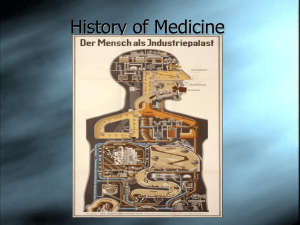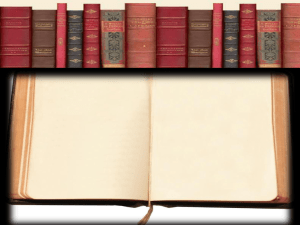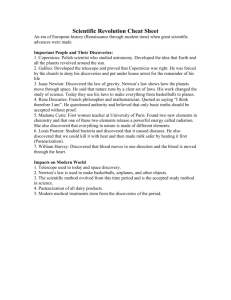TOMBSTONE SCIENCE PROJECT Scientists
advertisement
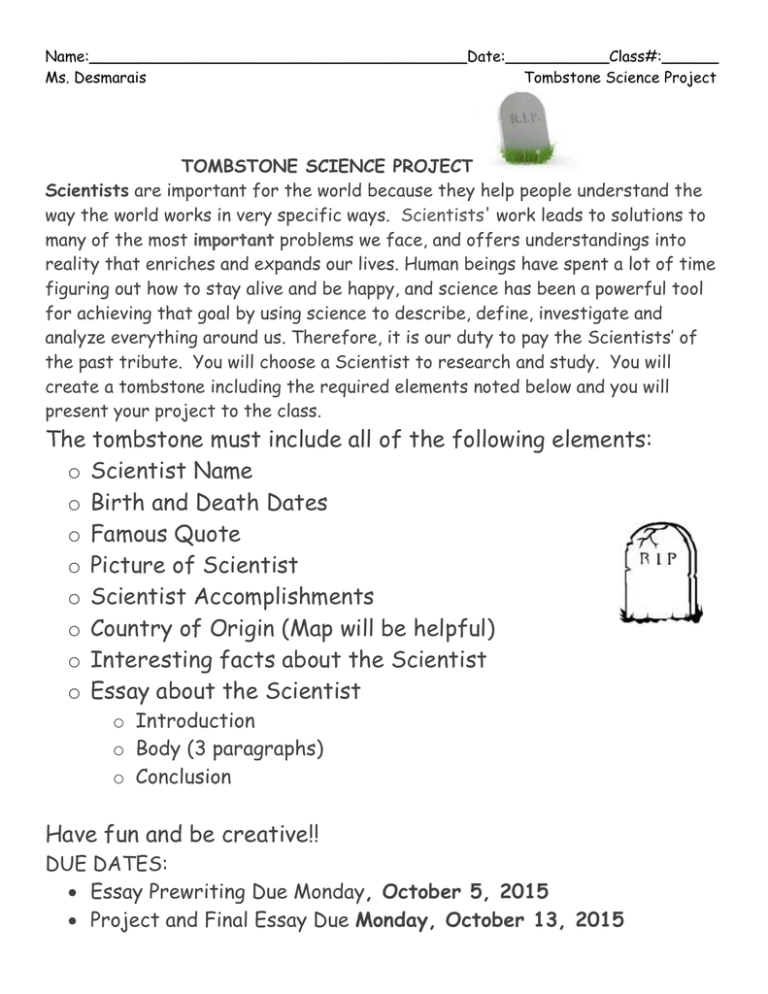
Name:________________________________________Date:___________Class#:______ Ms. Desmarais Tombstone Science Project TOMBSTONE SCIENCE PROJECT Scientists are important for the world because they help people understand the way the world works in very specific ways. Scientists' work leads to solutions to many of the most important problems we face, and offers understandings into reality that enriches and expands our lives. Human beings have spent a lot of time figuring out how to stay alive and be happy, and science has been a powerful tool for achieving that goal by using science to describe, define, investigate and analyze everything around us. Therefore, it is our duty to pay the Scientists’ of the past tribute. You will choose a Scientist to research and study. You will create a tombstone including the required elements noted below and you will present your project to the class. The tombstone must include all of the following elements: o Scientist Name o Birth and Death Dates o Famous Quote o Picture of Scientist o Scientist Accomplishments o Country of Origin (Map will be helpful) o Interesting facts about the Scientist o Essay about the Scientist o Introduction o Body (3 paragraphs) o Conclusion Have fun and be creative!! DUE DATES: Essay Prewriting Due Monday, October 5, 2015 Project and Final Essay Due Monday, October 13, 2015 • • • • • • • • • • • • • • • • • • • • • • • • • • • • • • • • • • • • • • • • • • • • • • Aage Bohr Ada Lovelace Adalbert Czerny Agnes Arber Ahmed Zewail Al-Battani Alan Turing Albert Abraham Michelson Albert Einstein Alberto Santos-Dumont Albrecht von Haller Aldo Leopold Alessandro Volta Alexander Bain Alexander Fleming Alexander Graham Bell Alexander Von Humboldt Alfred Binet Alfred Blalock Alfred Kinsey Alfred Nobel Alfred Russel Wallace Alfred Wegener Amedeo Avogadro Anders Celsius André Marie Ampère Andreas Vesalius Angel Alcala Antoine Lavoisier Antonie van Leeuwenhoek Antonio Meucci Antony Hewish Archimedes Aristarchus Aristotle Arnold Orville Beckman Arnold Sommerfeld Arthur Eddington Artturi Virtanen Avicenna B. F. Skinner Barbara McClintock Beatrix Potter Benjamin Franklin Benjamin Thompson Bernardo Houssay • • • • • • • • • • • • • • • • • • • • • • • • • • • • • • • • • • • • • • • • • • • • • • Claude Levi-Strauss Clyde Tombaugh Daniel Bernoulli David Bohm David Hilbert Dian Fossey Dmitri Mendeleev Dorothy Hodgkin E. O. Wilson Edmund Halley Edward Jenner Edward Teller Edwin Herbert Land Edwin Hubble Elizabeth Blackwell Emil Adolf Behring Emil Fischer Emil Kraepelin Emile Berliner Emmy Noether Enrico Fermi Eratosthenes Ernest Rutherford Ernst Haeckel Ernst Mach Ernst Mayr Ernst Werner von Siemens Erwin Chargaff Erwin Schrodinger Euclid Evangelista Torricelli Fibonacci Francesco Redi Francis Bacon Francis Crick Francis Galton Franz Boas Frederick Gowland Hopkins Frederick Sanger Frederick Soddy Friedrich August Kekulé Friedrich Wöhler Fritz Haber Galen Galileo Galilei Gene Shoemaker • • • • • • • • • • • • • • Bill Nye Blaise Pascal Brahmagupta Brian Cox C. V. Raman Carl Bosch Carl Friedrich Gauss Carl Sagan Carolus Linnaeus Charles Babbage Charles Darwin Charles Lyell Charles Sherrington Charles-Augustin de Coulomb • Chen-Ning Yang • Christiaan Huygens • Christiane NussleinVolhard • Clarence Birdseye Claude Bernard • • • • • • • • • • • • • • • • • • • • • • • • • • • • • • • • • • • • • • • • • • • • • • Georg Ohm George Beadle George Gamow George Gaylord Simpson George Washington Carver Georges-Louis Leclerc, Comte de Buffon Gertrude Elion Gerty Theresa Cori Glenn Seaborg Gottfried Leibniz Gottlieb Daimler Grace Murray Hopper Gregor Mendel Guglielmo Marconi Gustav Kirchoff Gustav Ludwig Hertz Hans Bethe Hans Christian Oersted Hans Selye Harriet Quimby Hedy Lamarr Heike Kamerlingh Onnes Heinrich Hertz Hendrik Antoon Lorentz Henri Becquerel Henrietta Swan Leavitt Henry Bessemer Henry Cavendish Henry Ford Henry Moseley Hermann Rorschach Hermann von Helmholtz Homi Jehangir Bhabha Humphry Davy Ibn Rushd Inge Lehmann Irene Joliot-Curie Isaac Newton Ivan Pavlov J. Hans D. Jensen J. J. Thomson J. Robert Oppenheimer J. Willard Gibbs Jacques Cousteau Jagadish Chandra Bose James Chadwick • • • • • • • • • • • • • • • • • • • • • • • • • • • • • • James Clerk Maxwell James Dwight Dana James Hutton James Prescott Joule James Watson James Watt Jan Baptist von Helmont Jane Goodall Jane Marcet Jean Piaget Jean-Baptiste Lamarck Jocelyn Bell Burnell Johannes Kepler John Archibald Wheeler John Bardeen John Dalton John Locke John Logie Baird John Napier John Needham John Ray John von Neumann Jonas Salk Joseph Banks Joseph Henry Joseph Lister Joseph Priestley Justus von Liebig K. Eric Drexler Karl Landsteiner • 1619 – Kepler publishes his third law of planetary motion relating the time taken for a planet to orbit the sun with its distance from the sun. • 1621 – Willebrord Snell discovers the laws of light refraction. • 1628 – Kepler publishes his planetary tables, the calculations for which would have taken years without Napier’s logarithms. • 1629 – Nicolaus Cabeus finds there are two types of electric charge and notes both attractive and repulsive forces acting. • 1632 – William Oughtred invents the slide rule. With the combined power of logarithms and slide rules, calculation speeds explode. • 1632 – Galileo Galilei finds that the laws of motion are the same in all inertial reference frames. • 1637 – Rene Descartes invents the Cartesian coordinate system – i.e. the x-y axis for graphs, allowing changes in quantities with time to be plotted. • 1645 – Blaise Pascal invents the adding machine. • 1652 – Thomas Bartholin discovers the human lymphatic system. • 1662 – Robert Boyle publishes his law of pressure and volume in gases. • 1654 – Blaise Pascal and Pierre de Fermat invent the mathematics of probability and statistics. • 1656 – Christiaan Huygens discovers Saturn’s rings after building a new telescope – the world’s best. • 1657 – Pierre de Fermat uses the principle of least time in optics. • 1658 – Jan Swammerdam discovers the red blood cell. • c1660 – Otto von Guerkicke builds a rotating sphere from which sparks fly. Static electricity can now be generated. He demonstrates electrostatic repulsion. • c1660 – Robert Hooke discovers that the extension of a spring or elastic material is directly proportional to the applied force. • 1661 – Robert Boyle writes The Skeptical Chymist, with his manifesto for the science of chemistry, explaining the roles of elements and compounds, and telling scientists they must carefully observe, record and report scientific data. • 1633 – James Gregory publishes his design for the world’s first reflecting telescope. • 1664 – Robert Hooke uses a microscope to observe the cellular basis of life. • 1665 – Isaac Newton invents calculus – the mathematics of change – without which we could not understand the modern world. He keeps it secret, using it to develop theories which he eventually publishes in 1687. • 1666 – Isaac Newton discovers that light is made up of all of the colors of the rainbow, which are refracted by different amounts in a glass prism. • 1667 – Isaac Newton builds the world’s first reflecting telescope. • 1668 – John Wallis discovers the principle of conservation of momentum – one of the foundations of modern physics. • 1669 – Hennig Brand becomes the first identifiable person to have discovered and isolated a new chemical element – phosphorus. • 1674 – Antony van Leeuwenhoek discovers microorganisms. • 1675 – Robert Boyle shows that electric repulsion and attraction act in a vacuum. • 1676 – Ole Christensen Roemer measures the speed of light for the first time. • 1676 – Christiann Huygens finds light can be refracted and diffracted and should be considered to be a wave-like phenomenon. • 1684 – Gottfried Leibniz publishes his calculus, which he discovered independently of Isaac Newton. He has been working on calculus for the past decade. • 1687 – Isaac Newton publishes one of the most important scientific books ever: Philosophiae Naturalis Principia Mathematica, revolutionizing physics and our understanding of gravity Search Famous Scientists Scientist of the Week • Fibonacci: Rebirth of Western mathematics Recent Scientists of the Week • • • • • • • • • • • • • • • • • • • • • • • • • • • • • • • • • • • • • • • • • • • • • • • • Joseph Henry: Master of electromagnetic science Antoine Lavoisier: Revolutionized chemistry Emmy Noether: Unlocked a secret of the universe Antonie van Leeuwenhoek: The father of microbiology Ernest Rutherford: Discovered the atomic nucleus and proton J. J. Thomson: Discovered the electron Alexander Fleming: Discovered penicillin and more Jacques Cousteau: Marine pioneer, inventor, Oscar winner Willard Gibbs: Father of chemical thermodynamics Sergei Winogradsky: Discovered chemosynthetic life forms Inge Lehmann: Discovered our planet's solid inner core Aage Bohr: Explained the structure of the atomic nucleus Alfred Wegener: Discovered continental drift Chen-Ning Yang: Thought the unthinkable; broke parity Johannes Kepler: Solved the mystery of the planets William Harvey: Explained blood circulation for the first time Glenn Seaborg: Record breaking discoverer of elements Isaac Newton: Gravity, light, the laws of motion and calculus Carolus Linnaeus: Organized our view of the natural world Thales of Miletus: The first scientist in history Ada Lovelace: Mother of computing science Amedeo Avogadro: A founder of atomic-molecular chemistry Pierre de Fermat: So much more than his famous last theorem Henry Moseley: Discovered the periodic table's true basis Galen: Shaped medicine for 1500 years Nicolaus Copernicus: Started the scientific revolution Aristotle: Genius and enduring errors Marguerite Perey: Discoverer of francium Luis Alvarez: Dinosaur death by meteorite impact Michael Faraday: Experimental genius; electromagnetic pioneer David Hilbert: Driving force in 20th century mathematics Santiago Ramón y Cajal: Father of modern neuroscience Subrahmanyan Chandrasekhar: Black hole formation John Dalton: Dalton's Atomic Theory is the basis of chemistry Robert Hooke: Discovered cells; revealed the microscopic world Robert Bunsen: Discoverer of elements & antidote to arsenic Benjamin Franklin: Proved electricity is a force of nature Alexander Graham Bell: Inventor of the telephone Marie Curie: Discoverer of elements. Radioactivity pioneer Galileo Galilei: The father of modern science Alfred R. Wallace: Discoverer of evolution by natural selection Aristarchus: First to say that Earth orbits the sun Jane Marcet: Inspirational chemistry Pythagoras: The first rigorous mathematics Alessandro Volta: Electrical pioneer. Inventor of the battery James Watt: Father of the industrial revolution Gene Shoemaker: First astro-geologist. Comet discoverer Brahmagupta: Discoverer of zero • • • • • • • • Archimedes: The greatest scientist ever? Eratosthenes: Accurately calculated Earth's size 2500yr ago Stephanie Kwolek: Inventor of kevlar James Clerk Maxwell: Unified electricity, magnetism & light Albert Einstein: Theories of relativity and E = mc2 Gregor Mendel: Founder of the science of genetics Dmitri Mendeleev: The periodic table discovered in a dream James Chadwick: Discoverer of the neutron Famous Scientists • • • • • • • • • • • • • • • • • • • • • • • • • • • • • • • • • • • • • • • Katharine Burr Blodgett Kip S. Thorne Konrad Lorenz Kristian Birkeland Lee De Forest Leo Szilard Leon Foucault Leonardo da Vinci Leonhard Euler Lester R. Brown Linus Pauling Lise Meitner Louis Agassiz Louis de Broglie Louis Pasteur Lucretius Ludwig Boltzmann Luigi Galvani Luis Alvarez Luther Burbank Lynn Margulis Mae Carol Jemison Marcello Malpighi Marguerite Perey Maria Gaetana Agnesi Maria Goeppert-Mayer Maria Mitchell Marie Curie Mario Molina Mary Anning Max Born Max Delbruck Max Planck Max von Laue Michael E. Brown Michael Faraday Michio Kaku Mohammad Abdus Salam • • • • • • • • • • • • • • • • • • • • • • • • • • • • • • • • • • • • • • • • • • • • • • • • Muhammad ibn Musa al-Khwarizmi Murray Gell-Mann Niccolo Leoniceno Nicholas Culpeper Nicolaus Copernicus Niels Bohr Nikola Tesla Noam Chomsky Omar Khayyam Otto Hahn Paul Dirac Paul Ehrlich Pearl Kendrick Percy Lavon Julian Peter Debye Pierre Curie Pierre de Fermat Pierre-Simon Laplace Prafulla Chandra Ray Pythagoras Rachel Carson René Descartes Richard Feynman Rita Levi-Montalcini Robert Bosch Robert Boyle Robert Brown Robert Bunsen Robert Goddard Robert Hooke Robert Koch Ronald Fisher Ronald Ross Rosalind Franklin Rudolf Christian Karl Diesel Rudolf Virchow Salim Ali Sally Ride Santiago Ramón y Cajal Sergei Winogradsky Sheldon Lee Glashow Sigmund Freud Srinivasa Ramanujan Stephanie Kwolek Stephen Hawking Steven Chu Subrahmanyan Chandrasekhar Svante Arrhenius • • • • • • • • • • • • • • • • • • • • • • • • • • • • • • • • • • Thabit ibn Qurra Thales Theodor Schwann Theodosius Dobzhansky Thomas Alva Edison Thomas Hunt Morgan Thomas Kuhn Thomas Newcomen Thomas Willis Tim Noakes Timothy John Berners-Lee Tycho Brahe Ukichiro Nakaya Virginia Apgar Vladimir Vernadsky Walter Schottky Walther Wilhelm Georg Bothe Werner Heisenberg Wernher Von Braun Wilbur and Orville Wright Wilhelm Conrad Roentgen Wilhelm Ostwald Wilhelm Röntgen Wilhelm Wundt Willard Frank Libby William Buckland William Harvey William Herschel William Hopkins William Ramsay William Smith William Thomson Wolfgang Ernst Pauli Zora Neale Hurston Recent Posts
